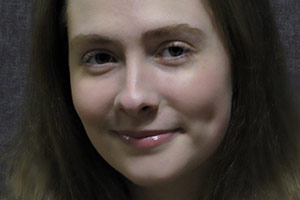Comedy tastes survey results
A little over a year ago, mid-coronavirus, British Comedy Guide ran a survey aiming to identify and chart comedy tastes amongst the public. 382 respondents completed the survey in full, and we're now happy to publish the results and some of our analysis for all to see.
Methodology isn't included here to prevent this article from becoming too long, but for those interested, we have also published notes on the survey's methodology. The (anonymised) raw answer data can also be made available upon request.
Format of Comedy
As the number of comedy dramas or "dramadies" increases, we wanted to see how their popularity compares to that of sitcoms.
In addition, as the number of traditional studio sitcoms (with a live audience) decreases, we wanted to know how their popularity compares to non-studio sitcoms (without an audience).
For both questions, the most commonly chosen answer was of having no preference, and liking both options equally.
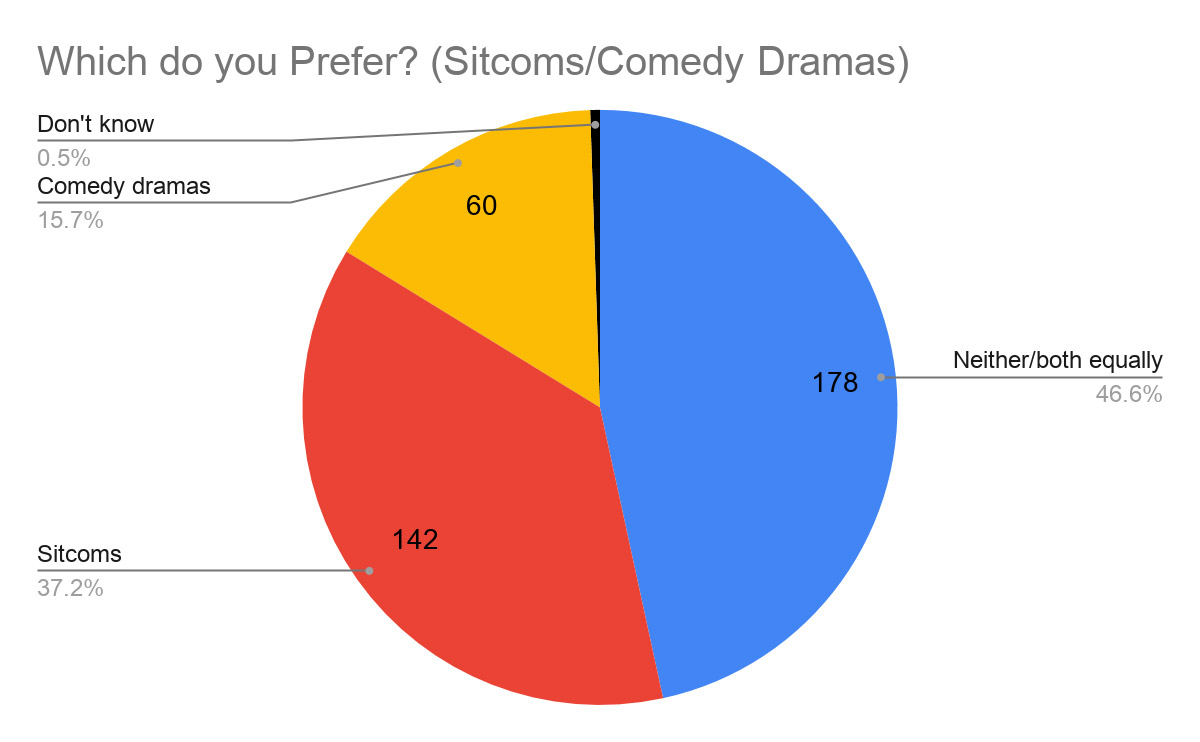
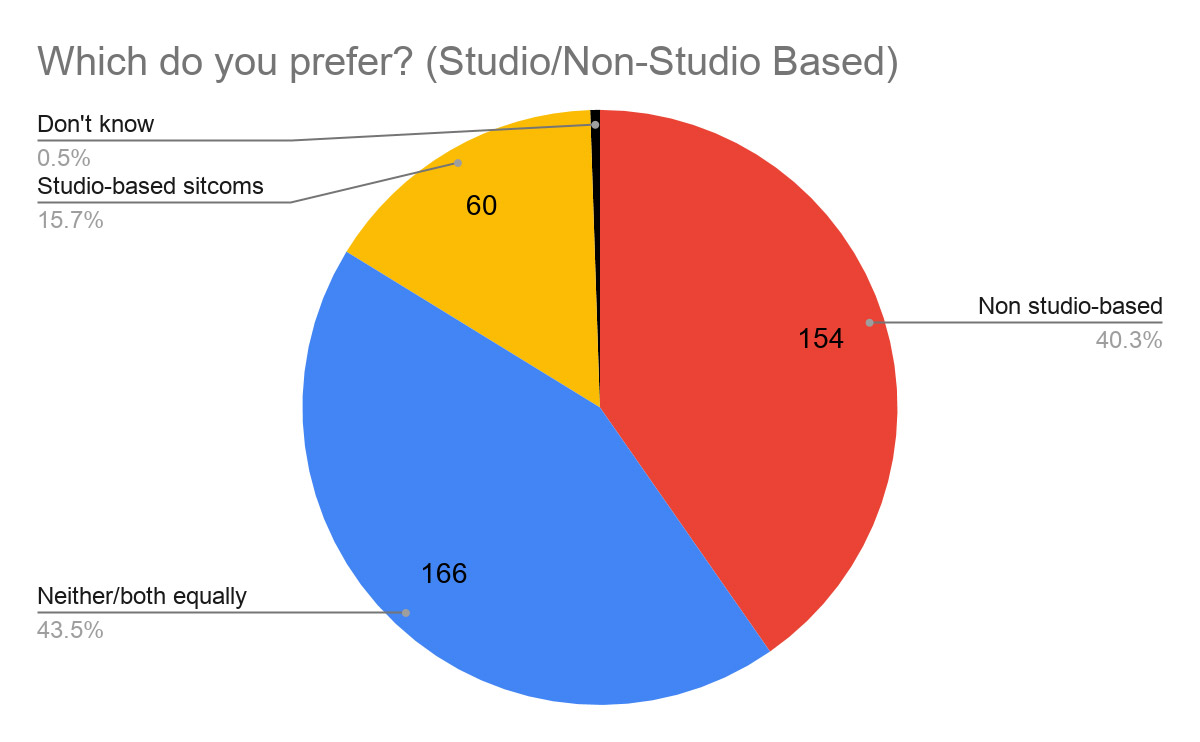
Therefore, although sitcoms scored higher than comedy dramas, and non studio-based scored higher than studio-based, these results suggest that having a range of both sitcoms and comedy dramas, as well as having both studio-based and non-studio based comedy shows, is ideal.
With both questions, if a comedy of either style was created, it would fit within the choice of over half of respondents, thus none should be considered an "unpopular" or "risky" option, with regards to appealing to a wide audience.
We also asked participants to rank several mediums in order of preference, and the results from favourite to least favourite are shown below:
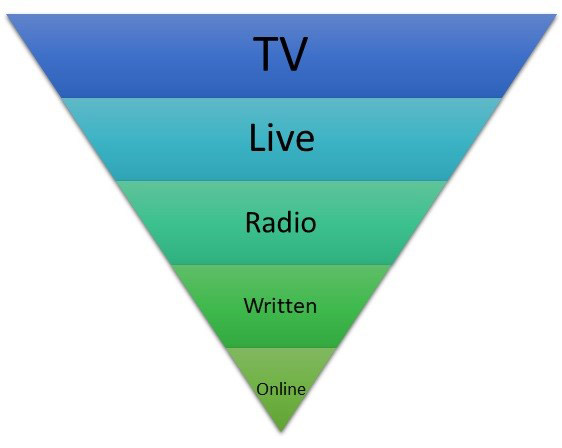
Whilst TV comedy is most popular, online comedy is the least popular.
Family Viewing
As watching TV individually rather than in families increases, we wanted to ascertain where participants like comedy to lie on a scale from family-friendly comedy to adult humour.
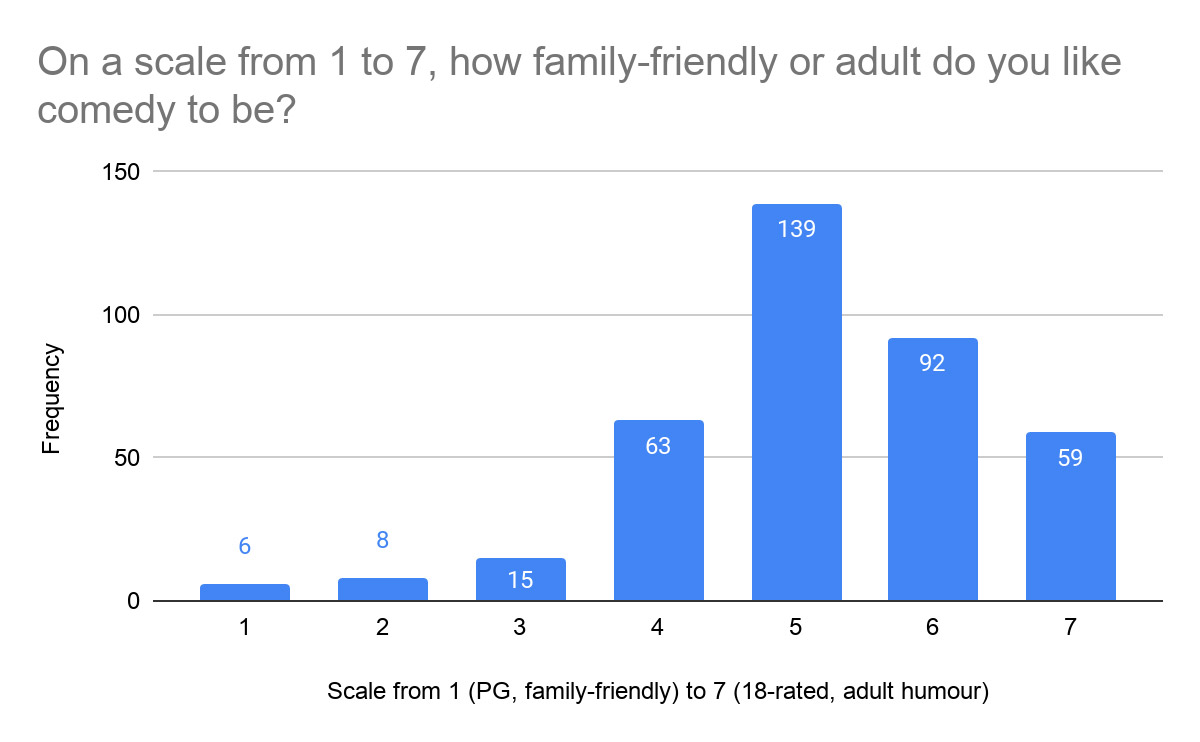
The average (mean) response for this question was 5.18, suggesting that respondents generally like comedy more on the "adult-humour" side, though not strongly so.
Seriousness/Silliness
As popular comedy is increasingly described with words like "edgy" and "dark," we wanted to discover where participants like their comedy to lie on a scale from 1 (not serious/silly/light) to 7 (very serious/dark/edgy).
We also asked participants where they think current comedy lies on this scale, in order to make a comparison.
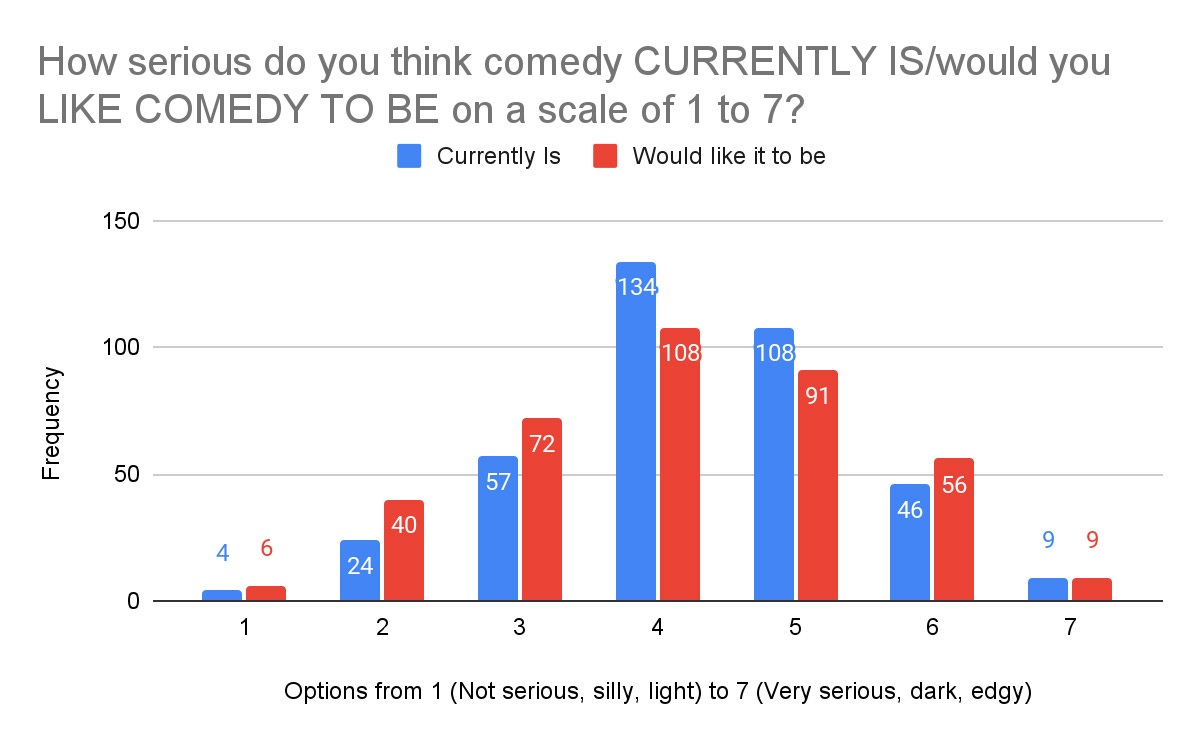
Participants generally would like comedy to lie roughly in the middle of this scale, with an average response of 4.16.
However, when asked where they think popular comedy currently lies on this scale, they picked a slightly higher average answer of 4.29.
This suggests that participants like comedy to be moderately serious/silly, and feel that current popular comedy fits this quite closely, though is slightly more serious than they would like on average.
Individual answers varied widely, with each number on the scale having been chosen at least once.
This suggests that whilst participants like their comedy to lie somewhere in the middle between silly/serious, once again having a range of seriousness/silliness in produced comedy is ideal, as all parts of the scale are represented, averaging out at around the middle. The difference between the preferred and current seriousness/silliness also suggests that having slightly less seriousness in comedy may help appeal to a wider audience.
We also asked participants to rank the seriousness of popular comedy in different decades, and the results are shown from most to least serious:
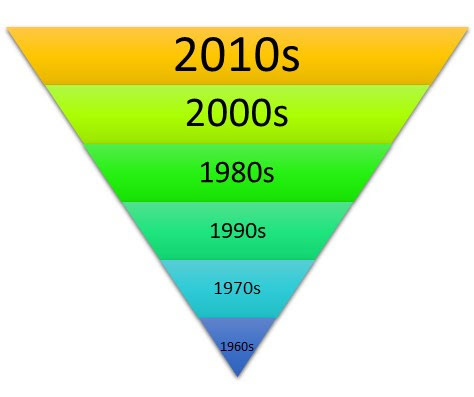
Participants felt that comedy has become more serious over time, with each decade's comedy generally seen as more serious than the last.
However, interestingly, 1980s comedy was seen as more serious than that of the 1990s.
Political Comedy
We asked how political participants feel popular comedy currently is, on a scale from 1 (no political/social-issues focus) to 7 (entirely political/social-issues focussed).
We also asked where they like comedy to lie on this scale.
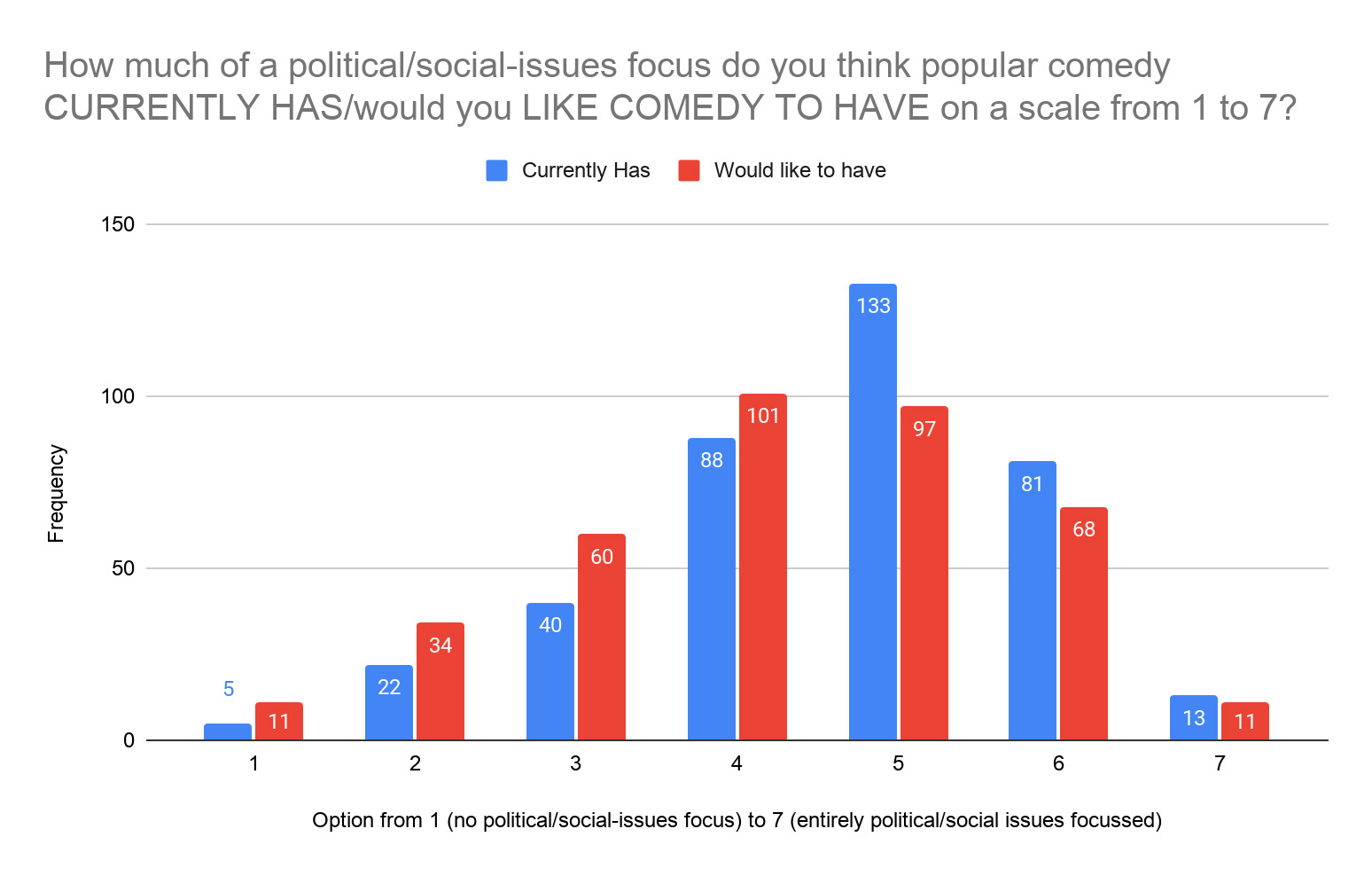
Participants generally would like comedy to lie roughly in the middle of this scale, with an average (mean) answer of 4.27.
However, when asked where they think popular comedy currently lies on these scales, they picked a higher average score of 4.62.
This suggests that whilst participants like comedy to lie ever so slightly above the centre of the scale, they feel that modern comedy has slightly more of a political/social-issues focus than they would like.
Once again, individual answers varied widely, with each number on the scale having been chosen by several participants.
Similar to previous questions, these answers suggest that producing a range of both political and apolitical comedy is ideal, as though all options from 1 to 7 were chosen, the preference averages out around the middle.
The difference between the perceived current political focus and the preferred political focus also suggests that perhaps having slightly less of a focus on political and social issues in comedy could help appeal to a wider audience.
Other Opinions
We also wanted to discover more specifically what people do and don't like about comedy. We left it open for respondents to come up with their own three words that, if used to describe a comedy, would make them either want, or not want, to watch (or listen to) it.
Below are word clouds made from all words chosen by at least three individuals, with the tick showing words used to describe "good" comedy, and the question mark including words to describe "bad" comedy (a cross wouldn't work, unfortunately).
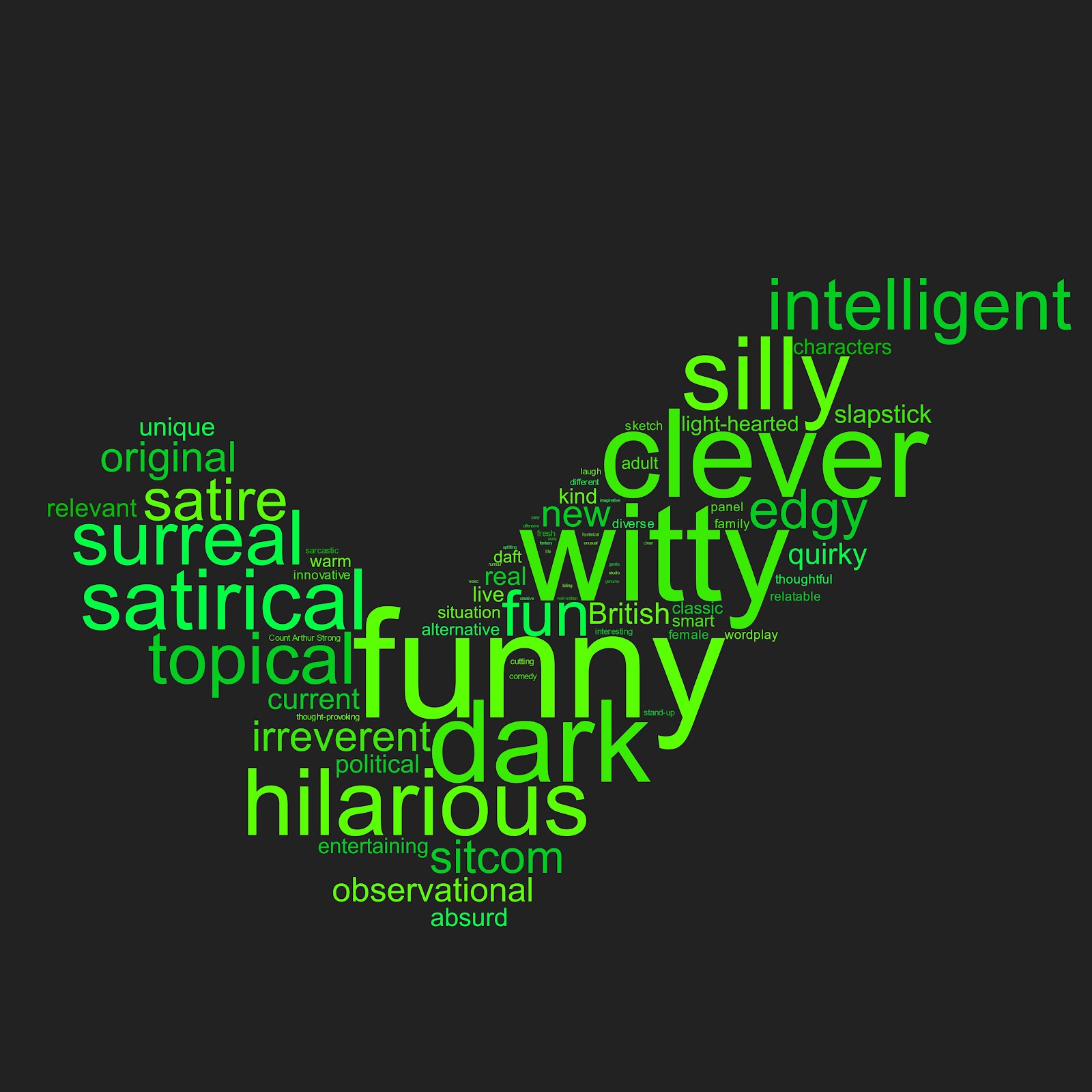
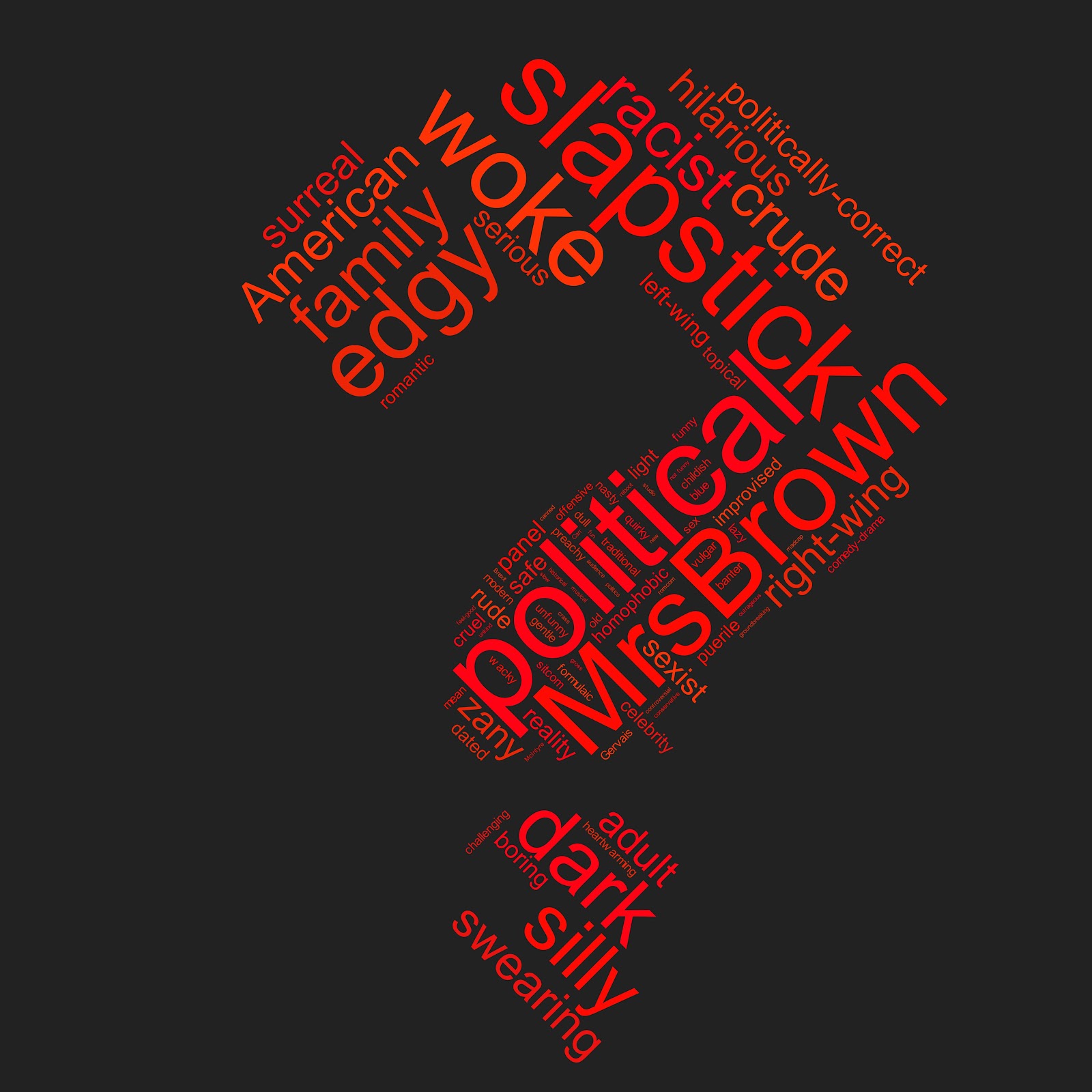
Interestingly, a large number of words appear in both word clouds. For example, "silly" and "dark" were common choices for both "good" and "bad" comedy. This once again suggests that having a range of comedy produced and available is a good idea, to cater to these different, but common, tastes.
When looking at words to describe "good" comedy, common words tend to pertain to its "feel", how it makes the audience feel, or its genre.
However, common words used to describe "bad" comedy often focus more specifically on its unwanted content (e.g. racism, swearing), its political/social leanings, or on specific shows/comedians.
Perhaps unsurprisingly for the audience of British Comedy Guide, "British" appears on the list of "good" words, with "American" appearing on the list of "bad" words.
(Note: Mrs. Brown's Boys has been shrunk to 'MrsBrown' in order to fit into the word cloud. The sitcom is clearly not very popular amongst participants, who often dedicated all three of their words to this particular show.)
We also asked participants why they watch comedy: useful information when trying to create comedy people will want to watch!
Though "entertainment" and "to laugh" were common and unsurprising reasons to watch comedy, other common reasons were:
- "Escapism" from both "real life and...real problems" as well as escapism and/or distraction from issues of the wider world such as "the pandemic" and the "political landscape". In addition, many enjoy comedy for its benefit on their mood, stating that it helps "improve mental health", "helps with anxiety" and "relieves the built up tensions of the day". It also "help[s them] lighten up / take things less seriously" and "laugh at ourselves/life".
- Respondents also enjoy comedy for its social element, stating that it provides "a feeling of camaraderie", helps them "feel connected to other humans" and "to something social." They also "enjoy the collaborative feeling of laughing together," and find that comedy can "serve as company."
- Many enjoy comedy "to educate" and to "think of things in a new way". They feel that "it gives people a voice", "allows a window into other people's thoughts and experiences" and "ideally helps you warm to and understand different people". They also like comedy's ability to "take serious topics... and actually make [them] easier to understand". Some also like comedy to be "thought provoking", and watch comedy in order "to be challenged".
- Finally, some like comedy in a more technical way. For example, they "like to see how the jokes are crafted", and are "interested in the form and structure of scripted comedy". They are "mentally stimulated by the setup, construction & delivery" and may even be comedians themselves, "so look to all comedy as '[their] business'."
Our final question asked for any last opinions about their preferred styles of comedy, and the styles they feel are currently most favoured. Many opinions were based on previous questions (e.g. the political leanings or seriousness of comedy.) However, there were some opinions that had not previously been covered, such as:
- "The same faces continually turning up on panel shows" and a sense that "all the shows seem to have comics from the same agency/pool."
- A belief that there are "not enough sketch shows" and that "It's a shame a lot of the sketch shows have disappeared".
- A feeling that there is too much emphasis on the comedian themselves. For example, "comedians just using their own personal experience", or " a constant need for the comedian....to be liked". They feel there is "too much of the writer's voice in the characters mouths" and that "comedy is better when it is not pushing a personal agenda" or "just stating views for agreement or applause not laughs".
- They feel that "there is not enough risk taking by commissioners nowadays, and new shows are too quickly dismissed" or "not given a chance - one series is commissioned, maybe two then it's cast aside". "There needs to be a braver approach to comedy commissioning."
Conclusion
This survey is unlikely to be fully representative of the views of the general public, as it was completed by those who specifically follow the British Comedy Guide, inevitably to some extent a self-selecting group taking more of an interest in comedy than the wider populace. In addition, there was an age bias amongst participants, with the majority belonging in the 40-59 age group:
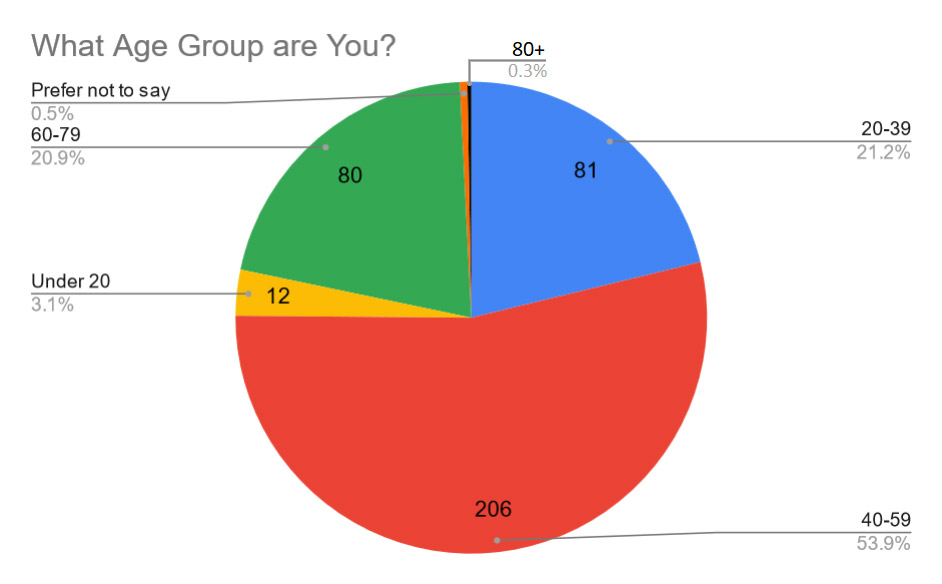
Overall, however, these results suggest that all types and genres of comedy have their fans. Producing a range of comedy (i.e. sitcoms and comedy dramas, non-studio and studio sitcoms, political and non-political etc.) would be ideal, as participants very often like different styles equally. In addition, where options were chosen on a scale, all opinions, including the most extreme ends, were represented, but with the answers tending to average out at around the middle.
Help us publish more great content by becoming a BCG Supporter. You'll be backing our mission to champion, celebrate and promote British comedy in all its forms: past, present and future.
We understand times are tough, but if you believe in the power of laughter we'd be honoured to have you join us. Advertising doesn't cover our costs, so every single donation matters and is put to good use. Thank you.
Love comedy? Find out more
